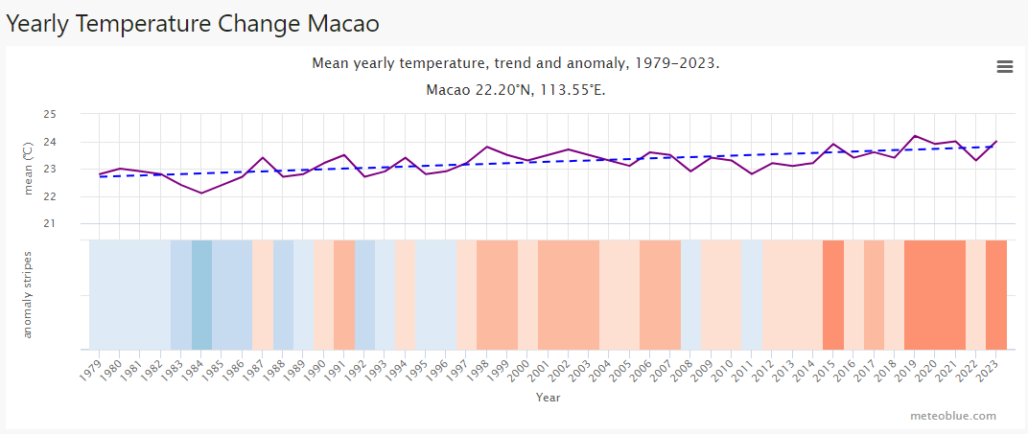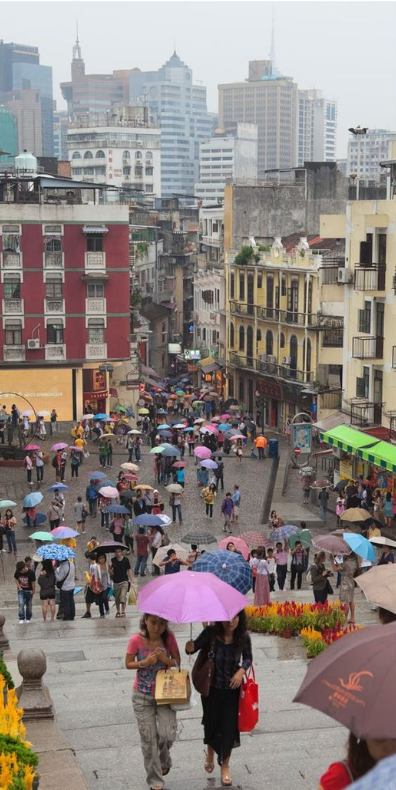Average temperatures are increasing, but in contrast, we have never had a December with such low temperatures as in 2022.
Macau Business | July 2024 | Special Report | How climate change(s) Macau
The residents of Macau have grown accustomed to reading news sources such as:
“There hasn’t been such a rainy summer in 15 years” or “2023 was Macau’s third hottest year on record.”
Although there is not enough data to establish a definitive trend (rainier? hotter? ), what we all realise is that the weather is unstable, volatile, and extreme.
And we all accept that it could be rainier and hotter at the same time.
The table attached to this piece, with some of the records released in recent years, shows this.
One of the strongest hypotheses is that global warming, because of climate change, will result in an increase in the average temperature in Macau.
This is what the graph below (courtesy of Meteoblue.com) shows us.

While at the end of the 1970s of the last century the average temperature did not reach 23º, this value was reached in the 1990s and has already been exceeded this century. At this time, the average value approaches 24º.
In the lower part of the same graph, we can see the so called warming stripes. Each coloured stripe represents the average temperature for a year—blue for colder years and red for warmer years.
And, as you can see, since 1997, there have only been two blues (2008 and 2011).
In contrast, in the first 20 years of the chart, 13 years were blue and seven were red.
If the forecasts from the Macau Meteorological and Geophysical Services (SMG) are confirmed, the weather will continue to warm: the average maximum annual temperatures in Macau, in the middle of this 21st century (2041–2060), should rise by around 1.3 °C and 1.6°C, respectively, in relation to the 1995-2014 average.
The SMG relied on the 2023 climate change report from the Intergovernmental Panel on Climate Change (IPCC) to project Macau’s climate change in the 21st century under different emissions scenarios.

“Under the average emissions scenario, the number of very hot days in the mid-21st century (2041-2060) will increase to 77.7 days per year, compared to the average of 27.8 days per year in 1995-2014, and the number of very hot days at the end of the 21st century (2081-2100) is expected to exceed 100 days per year”, the report reads.
The SMG stated that the global temperature in Macau will continue to increase and high temperature meteorological phenomena will become more frequent in the 21st century. Therefore, in the future, the number of very hot days in Macau will increase as the global temperature rises.

More sun, more rain and colder
Macau broke eight records when it comes to extreme weather in 2021 – three out of seven Signal No. 10 typhoons issued since 1968 occurred in the past six years.
On June 1, 2021, 433 mm of precipitation was recorded, the highest value in the last 69 years.
At least since 1999, there has not been a month of December with such low temperatures in Macau as in 2022. The average temperature of that month was 14.6 °C, which shows a drop of almost three degrees compared to 17.5 °C recorded in December 2021.
Macau’s mean air temperature in 2023 was 23.4 °C, 0.6 °C above the city’s climatological norm for 1991–2020. The number of very hot days (defined as 33 °C or higher) and hot nights (28 °C or higher) was also above normal.
The hottest day ever in March was recorded this year: 31 °C on March 26, exceeding the previous high of 29.8 °C recorded on March 19, 2008.
2023 was the third hottest year on record, with the average temperature at 23.3 °C and a record-breaking high of 35.2 °C recorded in October. The year was 0.5℃ warmer than what’s considered the climatological norm.
2023 was also wet; the cumulative rainfall stood at 295.4 mm, about four times the norm. According to reports, that summer was the wettest in 15 years.
The summer of 2023 was the wettest in the last 15 years. The 375.3 millimetres of average monthly precipitation are only exceeded by the 2008 value.
























